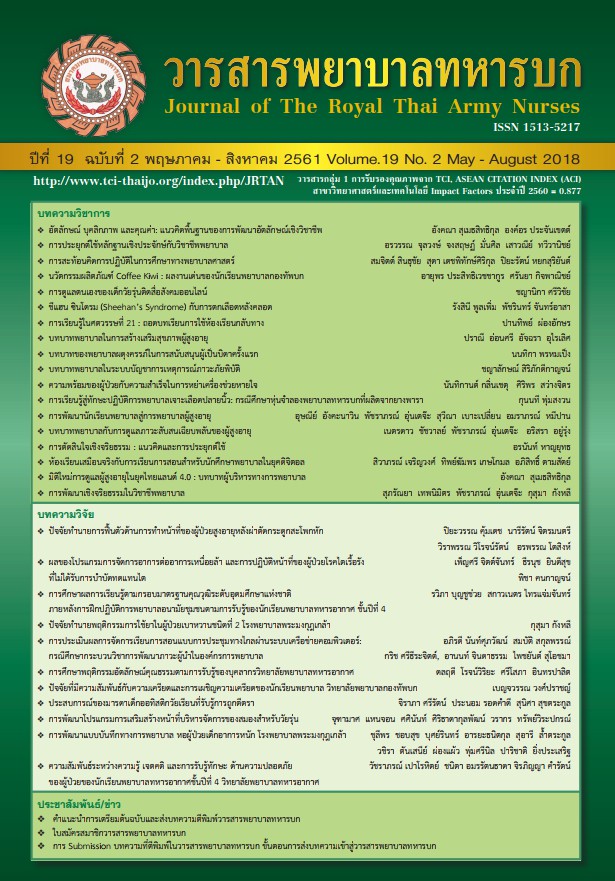Experiences of Mothers of School-Age Autistic Children Perceiving Affiliate Stigma
Keywords:
Affiliate Stigma Perception, Mothers of School-age Autistic ChildrenAbstract
The Qualitative descriptive study aimed to defining and explaining experiences of mothers of school-age autistic children perceiving affiliate stigma. The informants were seven mothers who had been primary caregivers of school-age autistic children aged 6 to 12 years old for at least three years and whose perceived affiliate stigma score was higher than 44 points. Data were collected by means of in – depth interviews and analyzed using Content analysis. The study findings revealed that the definition of affiliate stigma of mothers of school-age autistic children referred to negative reactions from people in society that reflected their rejection, lack of understanding, unacceptance, discrimination, and disgust toward school-age autistic children and their mothers, all of which were caused by autistic children’s inappropriate gestures and behaviors. As such, the mothers felt sad, miserable, and embarrassed since their children were stigmatized which leads themselves to be stigmatized because they were the mother and primary caregiver. In addition, the experiences of mothers of school-age autistic children perceiving affiliate stigma can be categorized into 4 major issues: 1) our child being different from other children, 2) perceived expressions of people in society, 3) effects of disgust, and 4) mothers’ adaptation. The study findings could be used as baseline data to generate profound understanding and as a guideline to further develop the body of knowledge and to devise a plan to more effectively offer assistance and support mothers to take care of school-age autistic children.
Downloads
References
2. Tadsing S, Somprasert C & Siriumpunkul P. The Effects of An Integrated Stress Management Program On The Stress Management Skills Of
Mothers Of Children With Autism spectrum Disorder. Journal of The Royal Thai Army Nurses. 2017; 18(2): 284 – 291. (in Thai).
3. Mak WWS & Kwok YTY. Internalization of stigma for parents of children with autism spectrum disorder in Hong Kong. Social Science and
Medicine. 2010; 70: 2045 – 2051.
4. Werner S & Shulman C. Subjective well – being among family caregivers of individuals with developmental disabilities: the role of affiliate
stigma and psychosocial moderating variables. Research in Developmental Disabilities. 2013; 34(11): 4103 – 4114.
5. Kinnear SH, Link BG, Ballan MS & Fischbach RL. Understanding the Experience of Stigma for Parents of children with Autism Spectrum Disorder and the Role Stigma Plays in Families’ Lives. Journal of Autism and Developmental Disorders. 2016; 46: 942 – 953.
6. Mak WWS & Cheung RYM. Affiliate stigma among caregivers of people with intellectual disability or mental illness. Journal of Applied Research in Intellectual Disabilities. 2008; 21(6): 532 – 545.
7. Medical Statistics Office, Rajanukul Institute. Annual statistics report in Rajanukul Institute during 2008 – 2012. Bangkok: Rajanukul Institute; 2013. (in Thai).
8. Waithayopathum Y. Child and Adolescent Psychiatric Hospital. Annual statistics client report during 2014 – 2016. Samutprakan: Yuwaprasart Waithayopathum Child and Adolescent Psychiatric Hospital; 2017. (in Thai).
9. Goffman, E. Stigma. Englewood Cliffs, New Jersey: Prentice – Hall; 1963.
10. Weitlauf, A.S., Vehorn, A.C., Taylor, J.L. & Warren, Z.E. Relationship satisfaction, parenting stress, and depression in mothers of children
with autism. Autism Journals, 2014; 18(2): 194 – 198.
11. Sandelowski, M. Whatever happened to qualitative description?. Research in Nursing and Health. 2000; 23: 334 – 340.
12. Chokerasamehirun J. Effect of a Group Psychoeducational Program to Reduce Stigma in Family Caregivers of Schizophrenic Patients. A Thesis for the Degree of Master of Nursing Science in Mental Health and Psychiatric Nursing. Bangkok: Mahidol University. 2010. (in Thai).
13. Photong P, Chansuwan S, Kachat S & Sanchalad S. Study of Health Status of Autistic Children, Knowledge and Stress Levels of Caregivers of Children with Autistic Receiving Service at the Special Education Center (Region 5), Suphanburi Province. Journal of Phrapokklao Nursing Collage. 2014; 25(2): 26 – 40. (in Thai).
Downloads
Published
How to Cite
Issue
Section
License
บทความหรือข้อคิดเห็นใดใดที่ปรากฏในวารสารพยาบาลทหารบกเป็นวรรณกรรมของผู้เขียน ซึ่งบรรณาธิการหรือสมาคมพยาบาลทหารบก ไม่จำเป็นต้องเห็นด้วย
บทความที่ได้รับการตีพิมพ์เป็นลิขสิทธิ์ของวารสารพยาบาลทหารบก
The ideas and opinions expressed in the Journal of The Royal Thai Army Nurses are those of the authors and not necessarily those
of the editor or Royal Thai Army Nurses Association.






